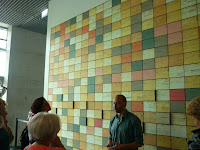 |
| German bread & pretzels |
One reason we travel - or I do, anyway - is to see a different side of life/the real world/"out there." I dwell in my own head perhaps more than most people, since I am not only a writer, but a writer who is partially introverted. Now and then, I need to honor the extrovert in myself, to process things from the outside in. Little is as fascinating as a gentle challenge to what my mind had settled on as "reality."
And part of reality, the real, is the site specific: local fare that does not echo the all-too familiar, that pleasing jolt that tells your brain that you are not home - and it's time to wake up and absorb every moment!
I love to note specialties particular to as small an area as possible. In a country like Italy, this is very easy. Move a few kms away from a region, and this or that food will be no longer available. In Germany, cuisine is somewhat less demarcated by state or region, but the phenomenon still exists. Overall, however, the fact that there are
distinctly German foods, customs, urban planning styles, etc. etc. was enough for me to delight every time I came across an authentic experience. I cherished each one, no matter how trivial.
Part of one of my current and ongoing projects is how, exactly,
to define the authentic in nature and in culture. (I'd love to hear feedback on this, publicly or privately.)
See the breads I photographed. I recognized them as bread, needless to say, because they resembled breads I had seen or even eaten in many cities across Europe and North America. Yet they bore the stamp of autheticity because they had a uniquely German aura about them. (It helped that pretzels were invented there!) Even before taking a bite, I experienced a kind of pleasure. (And the bites were
very good.) Those rolls did not echo or mimic other breads. German bread seemed
true to itself, and it reflected values I came to admire.
 |
| Magpies over Mitte |
Then we come to the photo of magpies in flight.
 |
| CCCP Bar, Mitte |
I have a fond memory of magpies from Italy 10 years ago. I tend to associate them with Europe, although the same species,
Pica pica, lives in North America (not in my region). Seeing more than one at once, and being able to take (a very long-view) photo gave me a little thrill:
I'm really in Europe again after a whole decade away! You can't get birds like these back home, so I must
be here!
Finally, perhaps a poor example of authenticity - a reminder of the USSR in East Berlin (CCCP is the Russian acronym). I snapped this on Rosenthalerstrasse on my very first day. Again, it told me I was away from home, I was walking in a formerly divided city that was divided by the former Soviet Union. Unique! It's authentic - even if the bar itself can be accused of pandering to the actual desire for the same.















